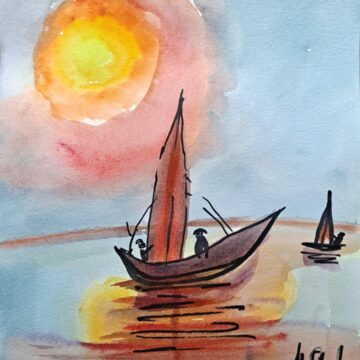AMM NextGen Artist Spotlight: Rashmi Rekha

A good artist understands that grappling with life’s greatest mysteries often leaves us with more questions than answers. A colorful convergence of abstracted figures, Rashmi Rekha’s bold and enigmatic painting Wise Men dares to question the role of so-called wise men in the modern world. The contrasting temperatures of the figural groupings, the frenetic motion of the thick brushstrokes, and the deliberately sparse inclusion of details—like the subtle texture of a judicial collar—all prompt viewers to ask difficult questions of their own. Who is considered wise in our society? Is their wisdom really worth imparting?
Rashmi is an Indo-Canadian painter whose vibrant work is unafraid to explore the vast landscape of the human experience—difficult questions and all. Based in Ottawa, Canada, she creates imaginative paintings characterized by emotional coloration and dynamic forms. Each tells a compelling story about what it means to be alive in the world today.


Painting has been a lifelong passion for Rashmi. While she pursued a university education in physics, and then a career in information technology, business management, and film production, she never stopped painting. “Physics taught me to observe, understand, analyze, and focus,” recounted Rashmi, “and having a career in business trained me to be results-oriented. This is what permeates all my actions in life.”
Rashmi draws upon a lifetime of unique experiences in her art—utilizing both the structure of scientific inquiry and the spontaneity of artistic imagination to explore the natural and social landscapes of the modern world. She visualizes universal social themes like collaboration, peer pressure, modern families and relationships, the consequences of wisdom and awareness, and the role of powerful institutions. “I am inspired by the social fabric of the contemporary world and the splendor of nature around me,” said Rashmi. “I am also inspired by stories that portray strong human emotions.”

The Kafka tale that inspired The Trial II is fictional, but the emotions are universal, whether you have actually experienced the nightmare of wrongful accusation or simply the torment of being misunderstood. Rashmi aptly calls upon the art historical aesthetic of Surrealism to unfold the unsettling psychological intensity of the scene. Time and space collapse around the blindfolded figure, who is surveyed by disembodied eyes, and a gavel looms above, threatening to strike at any moment.
“I could see how Kafka’s story was resonating in the present day almost all over the world in different forms,” explained Rashmi. “So many women and girls are still going through abuse and social isolation due to the cultural beliefs of their societies. And so many unsolved cases in the courts have left innocent men and women living in limbo after being blamed for a crime they never committed.”
By using figurative human forms to convey abstract human emotions, each of Rashmi’s paintings tells a story that resonates with viewers from all walks of life. Consequently, her work has captivated international audiences, and her creative talent has been recognized with many prestigious accolades—including an award personally presented to her by the Prime Minister of Canada in 2006.
One of Rashmi’s most recent paintings powerfully addresses the real-world devastation of the ongoing war in Ukraine. “I like to narrate my stories in colors,” said Rashmi. “I had never painted a bomb-shattered, destroyed building, and it was a challenge to paint in my colorful style.” The resulting contrast between the sanguine foreground palette and crumbling background textures tells a sobering true story.

Pride Without Prejudice celebrates ordinary heroism in the face of extraordinary oppression. An elegant figure, fancifully dressed with a Ukrainian flag resolutely in hand, stands out against the rubble. At her feet, a broken clock reminds us how war violently robs youth of the time of their lives. Just as her bleeding heart is depicted literally out of place, this innocent girl does not belong in such a harrowing landscape.
From international conflict to inner turmoil—and everything in between—Rashmi Rekha interrogates the chaos and complexity of modern life on every canvas. “Art provides opportunities to have cultural dialogue on identity, community, family, and nationality,” said Rashmi. “It also allows us to portray current social issues and to gain insight into sociocultural or political developments. It offers a platform to have a deeper understanding of emotions.”






